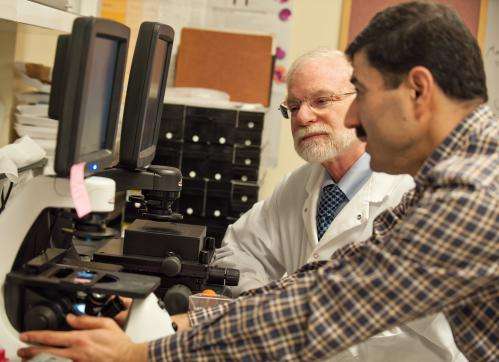New finding points to potential options for attacking stem cells in triple-negative breast cancer

New research from the University of Michigan Comprehensive Cancer Center and Georgia Regents University finds that a protein that fuels an inflammatory pathway does not turn off in breast cancer, resulting in an increase in cancer stem cells. This provides a potential target for treating triple negative breast cancer, the most aggressive form of the disease.
The researchers identified a protein, SOCS3, that is highly expressed in normal cells but undetectable in triple-negativebreast cancer. They showed that this protein is degraded in cancers, blocking the cellular off-switch of a feedback loop involving the inflammatory protein interleukin 6, IL6. When the switch does not get turned off, it enablescancer stem cellsto grow.
"We have known for a long time known that there are important links between inflammation and cancer, including similar pathways that regulate normal and cancerstem cells," says study author Max S. Wicha, M.D., distinguished professor of oncology and director of the U-M Comprehensive Cancer Center.
"This work helps explain why these pathways shut off in normal tissues after injury but remain active in cancers, resulting in an increase in cancer stem cells. Furthermore, they suggest that blocking these inflammatory loops may be a means of targeting cancer stem cells, improving patient outcome," he says.
The study appears in theNaturejournalOncogene.
Currently, there are no molecularly targeted therapies aimed attriple-negative breast cancer, which is a type of cancer negative for estrogen receptor, progesterone receptor and the HER2 protein – all key targets for current therapies. Patients with this form of disease tend to have worse outcomes.
The researchers tested a drug, bortezomib, in mouse models of triple-negative breast cancer and found that it stops the protein degradation, resulting in the inflammatory loop shutting off, which reduces the cancer stem cells, thereby blocking metastasis. Bortezomib is currently approved for treatment of the blood cancer multiple myeloma.
This team previously showed that IL6 can stimulate breast cancer stem cells in HER2-positive breast cancers and they are designing a clinical trial which uses an IL6 blocker. The new research suggests that adding bortezomib to the IL6 inhibitor may be a way to target stem cells in triple-negative breast cancer.
"Now that we unveiled how inflammation is regulated intriple-negative breast cancer, we expect that our studies can be translated into the clinic. The drugs used to block these chemical messengers are already approved for the treatment of rheumatoid arthritis and other inflammation-related diseases, which should facilitate their use in cancer," says study author Hasan Korkaya, Ph.D., assistant professor at the Georgia Regents University Cancer Center.
一个我们之前需要更多的实验室检测l trial can begin. The researchers also suspect that this pathway may apply to other cancers as well and are investigating that further.
Breast cancer statistics: 235,030 Americans will be diagnosed with breastcancerthis year and 40,430 will die from the disease, according to the American Cancer Society
更多的信息:Paper inOncogene,DOI: 10.1038/onc.2014.4

















